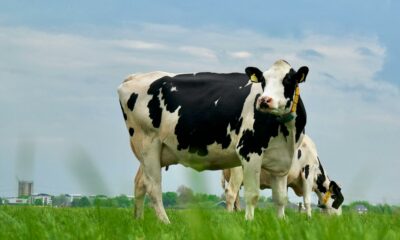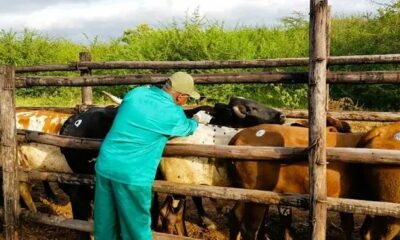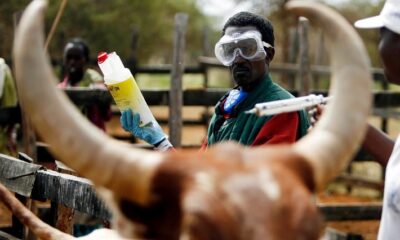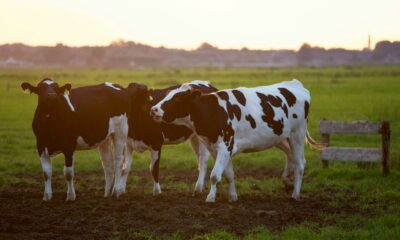News
Foot-and-Mouth Outbreak Threatens South Africa’s Beef Industry and Farmer Livelihoods
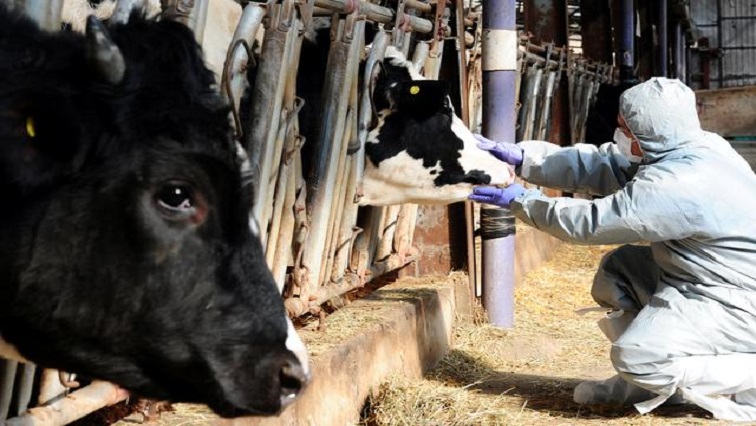
A livestock virus is spreading in Gauteng and while it’s not dangerous to humans, it could have serious economic consequences for farmers and meat lovers alike.
The confirmation of foot-and-mouth disease (FMD) at Karan Beef’s massive feedlot near Heidelberg this week has sent shockwaves through South Africa’s cattle industry. With over 120,000 animals on-site, the news couldn’t have come at a worse time: weaning season, when calves are usually sold and moved to feedlots across the country.
This isn’t just a rural concern, it’s something that could affect what ends up on dinner plates nationwide and the livelihoods of thousands who rely on cattle farming.
Karan Beef Suspends Exports, Supply Chain Feels the Strain
Dr Dirk Verwoerd, a senior veterinarian at Karan Beef, confirmed that around 2% of the herd at the Heidelberg feedlot has tested positive for FMD. As a result, the company has halted all exports and launched emergency containment measures in coordination with both provincial and national veterinary services.
“Despite our strict biosecurity protocols, FMD is extremely difficult to detect in its early stages,” said Verwoerd. “Subclinical carriers, animals that show no symptoms, make this virus particularly sneaky.”
Although the disease poses no threat to humans, the local beef supply might take a hit in the coming weeks. Feedlot capacity is now under pressure, and farmers could be forced to hold onto their calves longer than usual, adding to their financial strain.
A Disease That’s More Than Just a Health Risk
Foot-and-mouth disease may sound like a mild veterinary issue, but to those in the know, it’s the equivalent of a red alert. According to the World Organisation for Animal Health, the virus is highly contagious and causes severe economic damage — not because it kills large numbers of cattle, but because it completely disrupts livestock movement and trade.
Affected animals develop fever, mouth sores, and hoof blisters, leading to production losses, reduced milk output, and long recovery times. For young calves, it can be fatal.
And when a farm tests positive for FMD? Movement stops. Livestock can’t be sold, exports are suspended, and income disappears overnight.
Farmers Point Fingers at Government Inaction
For many in the agriculture sector, this outbreak was a long time coming, and entirely preventable.
Dr Theo de Jager, president of the Southern African Agri Initiative (SAAI), has been warning about FMD since December 2024. “It took months for the Department of Agriculture to acknowledge the threat, even though farmers were already seeing red flags,” he said.
Farmers reported seeing unregulated cattle transport, often on trailers bound for auctions, particularly in Mpumalanga. “That’s how it spreads,” de Jager said. “Once symptoms show, it’s already too late.”
No Income, No Aid: Farmers Plead for Government Support
The outbreak has once again exposed just how fragile the rural economy is. TLU SA and the Red Meat Producers’ Organisation have both called on government to activate an emergency fund or disaster relief programme for affected farmers.
“Farms are being removed from the value chain, and there’s no compensation,” said TLU SA chair Bennie van Zyl. “It’s like being shut down without notice.”
Meanwhile, prices for meat may begin to creep upward due to tightened supply. Ironically, the farmers trapped inside infected zones won’t benefit from this. With their livestock unsellable, they’re left watching their only source of income evaporate.
A History of Crisis And Lessons Not Yet Learned
South Africa has battled several FMD outbreaks in recent years, often traced back to weaknesses in monitoring and containment. Each outbreak chips away at market confidence, threatens food security, and sends ripples through the entire supply chain.
Yet, despite calls for stronger policies and faster responses, systemic delays and underfunding in animal health services persist. This latest incident could once again push both government and the private sector to reconsider the country’s preparedness.
What’s Next for South Africa’s Cattle Industry?
A controlled slaughter process will soon begin at Karan Beef, under tight veterinary supervision. But questions remain about how the virus entered the facility in the first place and whether other farms are already quietly infected.
The fear now is that unless stronger containment and movement control measures are enforced urgently, the outbreak could leap to other parts of the country, dragging even more farmers into crisis.
For a nation where beef is a staple and agriculture a major economic pillar, the message is clear: vigilance, speed, and support are no longer optional. They are essential.
Did you know?
South Africa’s FMD outbreaks have previously led to international bans on meat exports, costing the country billions in lost revenue.
Stay informed and support your local farmers. When in doubt, ask your butcher where the meat comes from local transparency helps protect both producers and consumers.
Why the Foot and Mouth Disease Outbreak in KZN Should Worry Everyone, Not Just Farmers
{Source: The Citizen}
Follow Joburg ETC on Facebook, Twitter , TikTok and Instagram
For more News in Johannesburg, visit joburgetc.com



